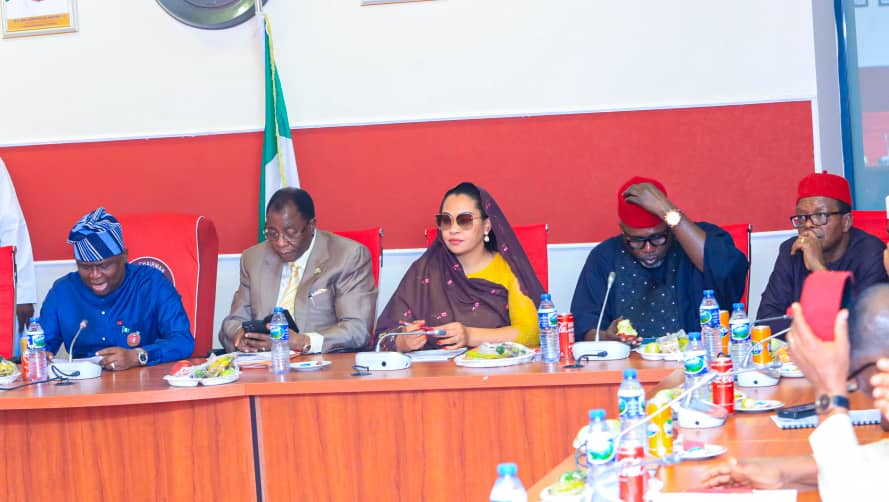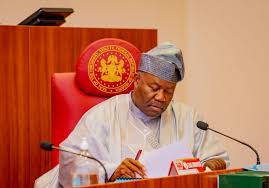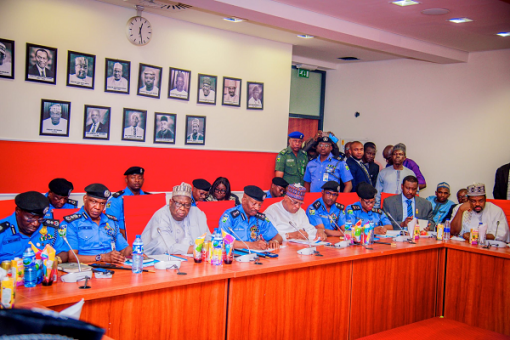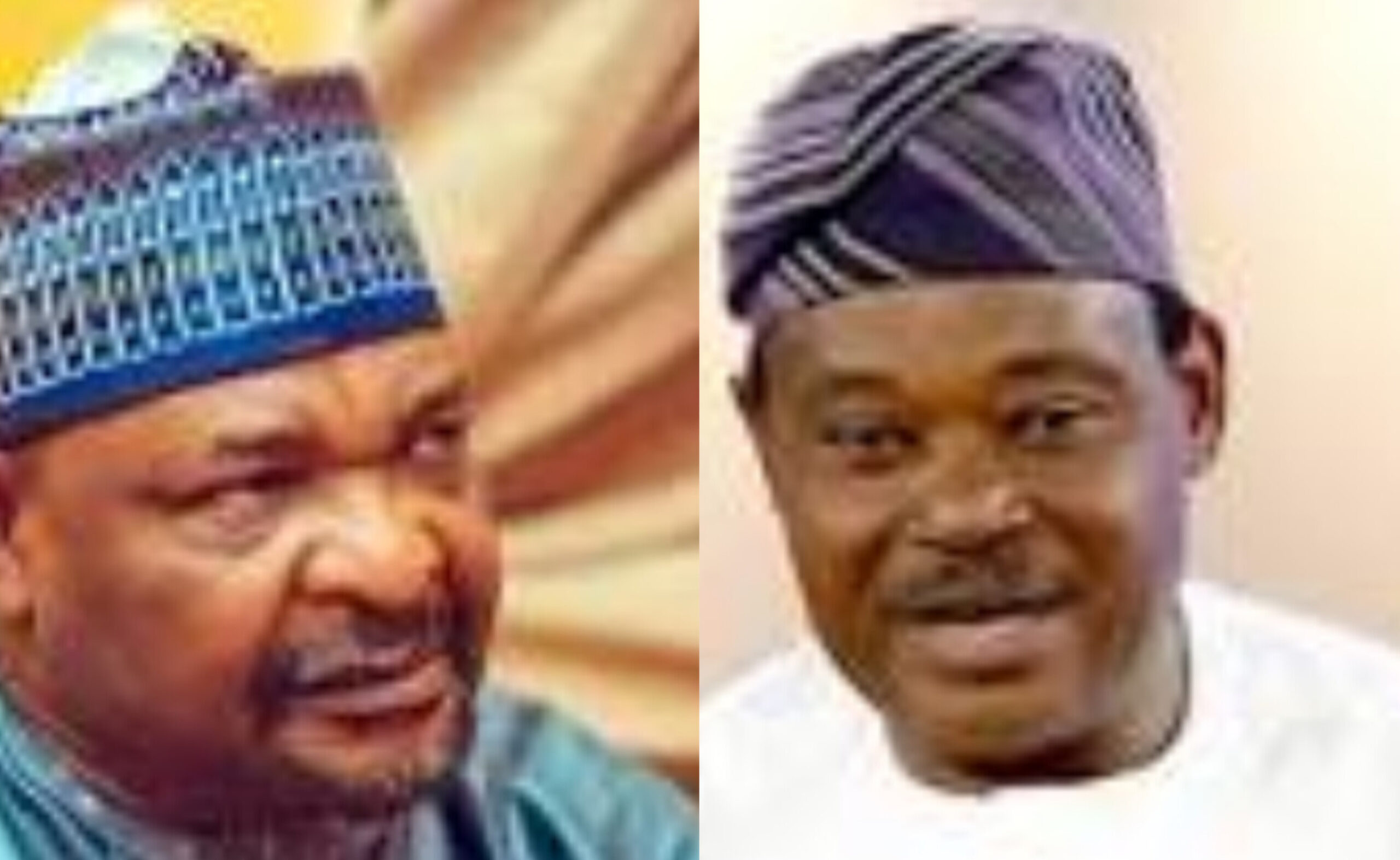Senate
Senator Natasha’s Push for Local Content Sparks Debate on Nigeria’s Economic Future

In a bold call for transformative change, Senator Natasha Akpoti-Uduaghan, Chairperson of the Senate Committee on Local Content, has urged the Nigerian Upstream Petroleum Regulatory Commission (NUPRC) to enforce policies that put Nigerian companies at the forefront of the oil and gas industry.
Her remarks at a high-stakes meeting with the Senate Committee on Appropriation, the Nigerian National Petroleum Corporation (NNPC), and the NUPRC spotlighted the urgent need to address the marginalization of local firms in favor of international contractors.
Using Samsung Heavy Industries Nigeria as a case study, Senator Akpoti-Uduaghan pointed to the company’s $272 million investment in a world-class fabrication facility in Lagos and the training of over 500 Nigerians. Despite this, Samsung has secured only one project since 2013. “This is an unsustainable trend,” she declared. “Local companies like Samsung have the infrastructure and expertise to deliver. Prioritizing them will reduce costs, speed up projects, and create thousands of jobs for Nigerians.”
The senator’s critique sheds light on systemic issues in Nigeria’s oil sector. Decades of advocacy for local content have yielded minimal results, with International Oil Companies (IOCs) continuing to favor foreign firms over Nigerian businesses that have invested in capacity building.
Her call for a policy overhaul aims to bridge this gap. “The current approach sends the wrong message to foreign investors and stifles local innovation. It’s time we deliver on our promises and foster a more inclusive economy,” she asserted.
Responding to these concerns, NUPRC Chief Executive Gbenga Komolafe highlighted some progress, including an increase in Nigeria’s rig count and enhanced capital expenditure. However, Komolafe admitted that more deliberate actions are needed to make local content compliance an industry standard.
This renewed focus on local content comes as Nigeria faces soaring unemployment and the pressing need for economic diversification. Experts suggest that boosting local participation in the oil and gas sector could trigger a ripple effect, revitalizing industries such as manufacturing, logistics, and technology.
Advocates believe that prioritizing local firms could redefine Nigeria’s oil sector, transforming it from a revenue hub to a platform for inclusive growth. This approach aligns with the global shift toward leveraging domestic expertise to stimulate broader economic benefits.
Senator Natasha’s impassioned advocacy may mark a pivotal moment for Nigeria’s economic policy. Her vision challenges the nation to rethink its approach to natural resource management, emphasizing that the true wealth of the oil sector lies not just in revenues but in its capacity to empower local communities and industries.
As the debate continues, one thing is clear: the time to act is now. The future of Nigeria’s oil industry and by extension, its economy depends on bold, inclusive policies that prioritize homegrown talent and enterprise.
Senate
Akpabio Decries Sycophancy in Governance, Advocates Genuine National Commitment

Senate President Godswill Akpabio has delivered a sharp rebuke to sycophants within government, criticizing political appointees who prioritize personal gain over genuine service to the nation.
Speaking at an interactive session and retreat organized by the Senate Committee on Appropriation in Abuja, Akpabio urged government officials to embrace loyalty to Nigeria’s progress rather than to individual leaders.
The session, held as part of deliberations on the proposed ₦49.7 trillion 2025 budget, provided a platform for the Senate President to address what he termed “a culture of opportunism” in governance.
“They plan their moves, align their turns, and grow their pockets—but not the nation. This is a grave disservice,” Akpabio remarked. He condemned officials who only show diligence in the presence of their appointors—whether presidents or governors—but neglect their responsibilities when unsupervised.
Akpabio contrasted these behaviors with the dedication of a minority of appointees who consistently perform their duties regardless of political or hierarchical pressure. “When an appointee works with the same passion in the absence of their leader, it reflects loyalty to the country, not just self-interest,” he noted.
The Senate President’s comments underscored a systemic issue in Nigeria’s political landscape, where sycophancy and self-serving politics hinder governance and development. Akpabio called for a cultural shift, urging appointees to serve with integrity and prioritize national interests above personal ambitions.
Akpabio also took aim at uninformed public criticism, particularly on social media, of critical legislative processes such as budget reviews and tax reforms. He emphasized the need for Nigerians to engage meaningfully with legislative processes, contributing ideas rather than spreading ill-informed opinions.
“This is the forum for constructive input,” he said, referring to the budget hearing. “Social media is not a replacement for understanding the intricacies of governance. Our task is formidable but achievable, and we must approach it with informed determination.”
He described the proposed 2025 Appropriation Bill as a “Portal of Restoration,” highlighting its significance as a tool to ignite prosperity, secure peace, and build a more resilient economy.
The public hearing on the 2025 budget brought together lawmakers, ministry officials, and representatives from civil society to align fiscal priorities with national goals. Akpabio’s strong remarks emphasized the importance of accountability and collaboration in governance, advocating a collective effort to build a stronger and more united Nigeria.
“We are custodians of Nigeria’s destiny, and our responsibility is to rise above personal interests to shape a better future,” he declared.
The Senate President concluded by reaffirming the legislature’s commitment to a transparent and inclusive budget process aimed at sustainable growth, national unity, and economic resilience.
Senate
Chaotic session disrupts Nigeria Police 2025 Budget Defence in National Assembly

A tense and disruptive scene unfolded in the National Assembly on Thursday during the Nigeria Police’s 2025 budget defence session, as lawmakers clashed over procedural issues, culminating in a walkout by Senator Onyekachi Nwoebonyi of Ebonyi North.
The Joint Committee, which was tasked with reviewing the budget and funding requests for the police, was thrown into disarray as the dispute intensified.
The trouble started when Inspector-General of Police (IGP) Kayode Egbetokun began outlining the police force’s budget, specifically regarding the planned construction of five zonal police headquarters. Representative Mark Esset of Akwa Ibom interrupted, pointing out that critical figures were missing from the budget document presented to committee members.
Senator Nwoebonyi, frustrated by the lack of proper documentation, demanded that the IGP provide all relevant details to the lawmakers. However, the Committee Chairman overruled his objection and allowed Egbetokun to continue with his presentation, sparking further tension.
In a dramatic move, Senator Nwoebonyi gathered his belongings and stormed out of the session, exchanging words with some House members who heckled him as he made his exit. His walkout left the session in turmoil, with other lawmakers expressing disappointment at the breakdown in order.
Following the disruption, Ranking Lawmaker Yusuf Gagdi defended the committee’s handling of the situation, stressing that parliamentary rules should be followed and members must wait to be recognized before speaking.
Once the dust settled, IGP Egbetokun addressed the ongoing financial challenges facing the police force. He reiterated the need for the removal of the police from the “envelope” budgeting system to ensure more reliable and adequate funding. He also shared the good news that President Bola Tinubu had approved a major increase in the police’s annual recruitment quota, boosting it from 10,000 to 30,000.
“This increase in recruitment will go a long way in helping the police force to meet the growing demands of national security,” Egbetokun said. He emphasized that sufficient funding and personnel would be key to improving the force’s performance in the coming year.
Senate
Tinubu’s Renewed Hope Housing Program Faces Senate Scrutiny Over N92b Debt, Project Visibility

The Senate was embroiled in a heated debate on Wednesday as lawmakers questioned the Ministry of Housing over its N92 billion contractor debt and the implementation of President Bola Tinubu’s Renewed Hope Housing Program. The session highlighted concerns about transparency, project visibility, and the ministry’s capacity to address Nigeria’s housing deficit.
Central to the session was the ministry’s claim of constructing 7,522 housing units under Tinubu’s Renewed Hope agenda, with 3,388 completed. However, Sen. Abdul Ningi (PDP, Bauchi Central) expressed skepticism, alleging that these units are invisible in key regions, including his constituency in Bauchi State.
“These housing units are supposed to be symbols of renewed hope, yet they seem to exist only on paper,” Ningi said, calling for detailed disclosure of project locations and status.
The senators also criticized the ministry’s financial management, particularly the unresolved N92 billion debt owed to 6,455 contractors.
Sen. Osita Ngwu (PDP, Enugu West) decried the plight of contractors, many of whom borrowed funds to execute government projects under the Renewed Hope initiative.
“These contractors have been abandoned, their livelihoods destroyed, while the housing deficit remains unaddressed,” Ngwu said, urging for a special intervention fund to settle the debts.
Sen. Ningi further raised concerns about the N22.6 billion unaccounted for from the 2023 supplementary budget. “How can we move forward when past allocations remain shrouded in mystery?” he asked, demanding comprehensive reports on budget utilization.
Sen. Jimoh Ibrahim (APC, Ondo South) defended the ministry, emphasizing that housing projects require time and careful planning.
“You don’t acquire land, do surveys, and build houses overnight,” Ibrahim argued, calling for patience and faith in the Renewed Hope Housing Program.
His defense, however, provoked an uproar, with lawmakers accusing him of shielding the ministry from accountability.
Amid the drama, Committee Chairman Sen. Aminu Tambuwal intervened, rebuking the ministry for its lack of preparedness. He directed its representatives to return on Monday with detailed reports on project locations, financial breakdowns, and plans to address contractor debts.
“This committee will not tolerate vague presentations. Nigerians deserve transparency and results,” Tambuwal asserted.
The contentious session underscored growing doubts about the Renewed Hope Housing Program’s effectiveness.
While some senators defended the ministry’s efforts to bridge Nigeria’s housing deficit, others insisted on concrete results to justify public trust and future funding.
As the debate intensifies, the Ministry of Housing faces mounting pressure to deliver on Tinubu’s vision of affordable housing and restore confidence in the administration’s flagship program.
-

 Crime1 year ago
Crime1 year agoPolice nabs Killer of Varsity Lecturer in Niger
-

 News12 months ago
News12 months agoFCT-IRS tells socialite Aisha Achimugu not to forget to file her annual returns
-

 Appointment1 year ago
Appointment1 year agoTinubu names El-Rufai, Tope Fasua, others in New appointments
-

 Kogi1 year ago
Kogi1 year agoINEC cancells election in 67 polling units in Ogori-Magongo in Kogi
-

 Kogi1 year ago
Kogi1 year agoEchocho Challenges Tribunal Judgment ordering rerun in 94 polling units
-

 News1 year ago
News1 year agoIPOB: Simon Ekpa gives reason for seperatists clamour for Biafra
-

 Metro10 months ago
Metro10 months ago‘Listing Simon Ekpa among wanted persons by Nigeria military is rascality, intimidation’
-

 News1 year ago
News1 year agoKingmakers of Igu/ Koton-Karfe dare Bello, urge him to reverse deposition of Ohimege-Igu
